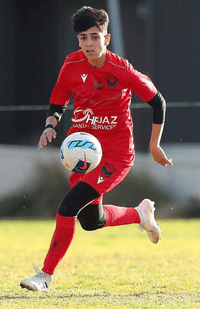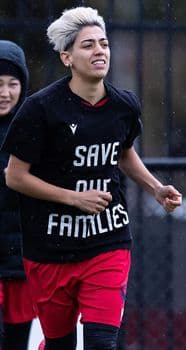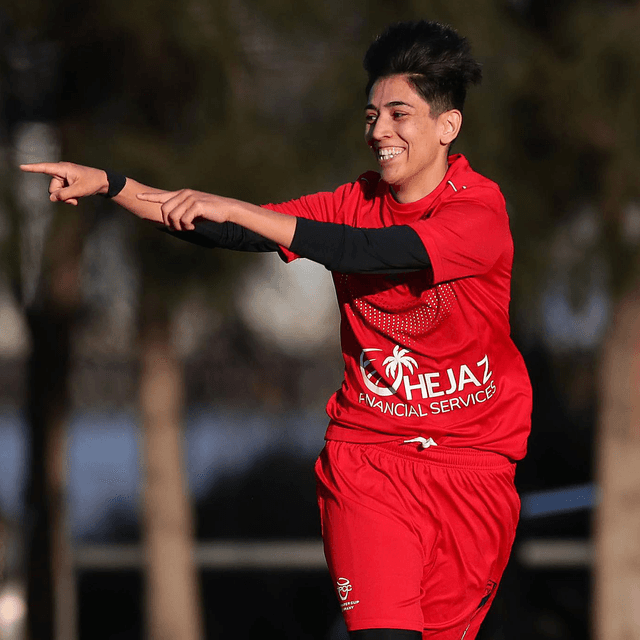
On August 15, 2021, Manozh Noori, 20, and her sister were on their way to football practice when their coach called.
“Run, and go back home,” he said, and make sure no one sees them or their soccer equipment.
“At that time, I froze, I was like a statue. I had no sense in my entire body. I couldn't feel anything,” said Manozh.
That was the day the Taliban took control of Kabul. Manozh’s life, like millions of other Afghan citizens, would be changed forever.
As members of the Afghan Women’s National Football team, Manozh and her teammates had a target on their back. Playing sports as a woman was a social taboo at best, and a crime at worst. They knew they had to flee the country.
Change was swift. In the immediate aftermath of the Taliban takeover, the Afghan president fled the country, the Taliban bombed the International Airport in Kabul to halt evacuations, and sweeping rules restricting the rights of women in the country were passed, including bans on women’s education.
Along with a group of advocates and lawyers, the team’s former captain, Khalida Popal, coordinated the team’s daring escape from the country. It’s been called the largest rescue of athletes in history.
Today, Manozh is in Australia with some of her teammates. Since escaping in 2021, they have continued to play soccer under Football Victoria’s third division in Melbourne. And they have been fighting for recognition from FIFA to represent their country on the world stage.

Manozh’s story
Manozh’s earliest childhood memories consist of playing football with boys in her neighborhood. She knew she was good. Playing gave her a growing sense of happiness and accomplishment.
“I’m a striker and whenever I score goals, even when I assist my teammates, it brings joy to me, it is extraordinary. It is beyond explanation. I feel like I am being reborn,” said Manozh.
But her older brothers were vehemently against the idea of a girl playing football, and she had to hide her passion from them. She went from playing on the streets to school teams, then private football clubs. She wore a mask to hide her identity when her matches were broadcast on television or social media.
Manozh eventually caught the attention of recruiters from the national football team – all in secret.
The first time she was asked to join the Afghanistan Women’s National Team, she turned it down and quit playing soccer at the request of her family. But Manozh couldn’t stay away from the sport for long.
“I couldn’t hold myself back, I needed to pursue my dreams. Through soccer, I can be someone that I want to be, this is my passion, I knew I had the talent and I had to go forward,” she said.
In June of 2021, she travelled with her team to Tajikistan to compete in the Central Asian Football Association Championship. And although they didn’t win the tournament, they returned with high spirits and excitement.
That was two months before the Taliban took over Afghanistan.
“I wasn’t born during the first Taliban take over, I didn’t have an image of what they were going to do. But I used to watch some images, some videos of other people and my family used to tell me how cruel they were,” said Manozh.
She knew one thing: “We were not safe, we needed to get out of Afghanistan.”
The escape
Manozh spoke to the team’s founder, Khalida Popal, and Popal worked with advocates to help the team members escape. It was highly coordinated chaos. Manozh left at night with a blue ribbon around her wrist to identify herself as a player of the Women’s National Football Team.
When she got to the airport, she said it resembled a “zombie apocalypse.” There were hordes of people trying to get out.
“It was like hell. People were rushing through the gates to get out of Afghanistan, old people and young people. At the same time, the Taliban was shooting around, beating men and women. More than hundreds of people were on the other side of the gate, on the street, and some inside, and they were all fighting to save themselves, to get out of Afghanistan. I still have nightmares about the situation.”
In the chaos, Manozh was separated from her mother and sister. They stayed behind.
In Australia days later, she heard that a friend of hers, an 18 year old player for Afghanistan’s Women's National Volleyball team, was beheaded.
Soon after, the Taliban banned all womens sports throughout the country.
Resettlement
Today, Manozh and her teammates have resettled in Australia. She is still waiting to be reunited with her mother and sister.
“Being away from my family, from my sister and mother, I could have never imagined being in a situation like that. It is still difficult,” said Manozh.
But playing soccer with her teammates gives her hope, a sentiment that she wants to share with other Afghan women by representing their country.
Manozh’s team asked to be recognized by FIFA so that they could represent Afghanistan in the Women’s World Cup.

“We are expecting FIFA to recognize our team as the Afghanistan women’s national soccer team overseas just like men are allowed in Afghanistan to play soccer and represent the country overseas to the world. If they are talking about gender equality, this World Cup is a huge example.”
FIFA said that it could not overrule the Afghan Football Federation, which is currently under control of the Taliban, by recognizing the team.
This year, Manozh and her teammates watched the Women’s World Cup from the sidelines. And although they couldn’t play, she said she was happy rooting for all the other women, playing from all around the world.
For Manozh, the Women’s World Cup was a reminder of the power of soccer.
“This world cup was huge for everyone. In Australia, everyone was celebrating all over the world. Soccer is the way we can bring solidarity, peace, multiculturalism, and diverse communities together.”
Although the Women’s World Cup has ended, Manozh’s team’s fight is far from over.
Their story caught the attention of women’s rights advocate Malala Yousafzai, who joined former team captain Khalida Popal to call on FIFA to put action behind their campaigns and slogans in support of women’s rights.
“It is time for FIFA to decide that they are not standing on the Taliban's side. It is time for FIFA to recognise that they are standing with the women of Afghanistan,” said Malala at a press conference during a visit to the team on Aug. 21.
“We don’t only represent our country. Because we are a female soccer team, we represent all the women in Afghanistan, how strong, bold, and powerful they are,” said Manozh.